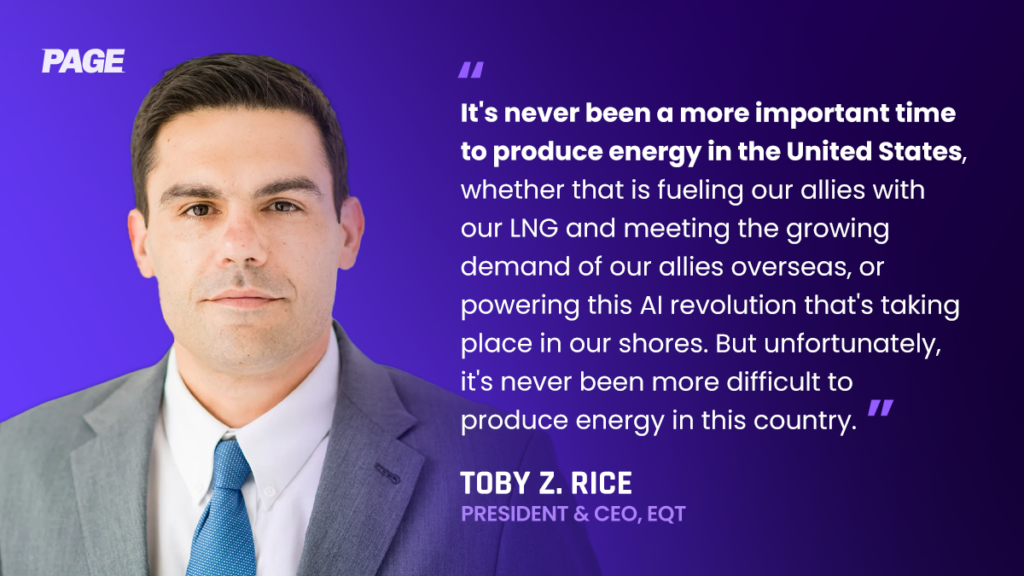U.S. natural gas can help us achieve our global climate goals and provide energy security for our allies
For years, Climate Week NYC has provided policymakers, government officials, and industry leaders with a platform to discuss effective solutions to decarbonize global emissions. Among over 100,000 estimated participants at Climate Week, the Partnership to Address Global Emissions (PAGE) was at the forefront of these conversations, emphasizing the bipartisan and international consensus that natural gas plays a key role in the energy transition as a reliable low-carbon energy source.
The consensus coming out of Climate Week is clear – natural gas is essential to achieving the dual goals of energy security and reducing global emissions, by decreasing dependence on global coal and dirtier energy from Russia. One of the most effective ways to lower power sector and industrial emissions is to switch from coal to natural gas, especially in regions heavily reliant on coal. We've seen the results of this approach firsthand in the U.S, where 65% of the country’s power sector emissions reductions from 2005-2019 were achieved through coal-to-gas switching.
“It’s Never Been a More Important Time to Produce Energy”
PAGE kicked off Climate Week by sponsoring an Axios event, “A Conversation on Global Deployment of Energy Alternatives to Coal.” During the “View from the Top” discussion, Toby Z. Rice, President & CEO of EQT, emphasized how replacing foreign coal with U.S. natural gas is the best way to continue reducing worldwide greenhouse gas (GHG) emissions, but that there are barriers to delivering affordable and reliable energy for consumers. Among these challenges include a lack of natural gas infrastructure and the Department of Energy’s pause on liquified natural gas (LNG) export approvals, preventing the U.S. from delivering sufficient natural gas supplies to our allies overseas. His remarks echoed earlier points raised by Ali Zaidi, Assistant to the President and National Climate Advisor, who noted “it’s increasingly hard to get natural gas infrastructure built in the United States," due to a number of roadblocks.

The conversation about the benefits of U.S. natural gas continued throughout Climate Week and culminated in the presentation of a new independent report released by the Center on Regulation in Europe – “Securing Europe’s Net Zero Path and Flexible LNG.” The study confirmed the key role of LNG as a transitional fuel that can ensure Europe’s energy security and achieve the EU’s ambitious climate goals. Notable speakers during the presentation included Ditte Juul Jørgensen, Director General for Energy of the European Commission, Ambassador Geoffrey Pyatt, Assistant Secretary of the Bureau of Energy Resources, and PAGE member Naomi Boness, Managing Director, Stanford Natural Gas and Stanford Hydrogen Initiatives, who highlighted the importance of cooperation among allies to ensure a reliable energy supply during times of heightened geopolitical instability.
In Europe, the absence of stable energy supplies has contributed to a volatile energy market, with electricity prices now 2-3 times higher than those in the U.S. according to the recent Draghi Report. As a consequence, several EU states are reopening once dormant coal plants to reduce energy costs. While there may be short-term economic benefits, this rise in coal-fired power generation can have disastrous climate impacts and not provide longer-term stability to energy markets in Europe and the rest of the world. In fact, if just 5% of the worst emitting coal-power plants switched to natural gas, global power sector emissions would be reduced by 30%. This would increase to nearly 50% if that switch incorporated carbon capture and storage.

From left to right: Geoffrey Pyatt, Ditte Juul Jørgensen, Toby Z. Rice
We Must Address the Elephant in the Room – Methane
Another important part of PAGE’s message at Climate Week focused on the need to address the elephant in the room – methane. The U.S. natural gas industry understands the critical role it must play in in reducing methane emissions and PAGE members have already taken significant steps to eliminate methane through investment and innovation. These efforts have helped establish U.S. natural gas as among the cleanest in the world.
As a result, U.S. methane emissions decreased by 23% from 2020 - 2022, with only an additional 7% decline needed by 2030 to meet the global methane pledge. By further reducing methane emissions across the natural gas value chain, we can continue to secure our allies’ energy in the cleanest way possible. Several House Democrats recently acknowledged this in a letter to President Biden, affirming that “American LNG is produced with some of the strongest environmental protections globally.”
The Bottom Line
As we navigate the complexities of the energy transition, U.S. natural gas stands alone as the most viable solution to reduce global GHG emissions and secure energy supplies. At Climate Week, this consensus was apparent among conversations with policymakers and industry experts, reflecting the pragmatic dialogue last year at COP28 that recognized natural gas as having a key role to play in meeting the goals of the Paris Climate Agreement.
As we look towards the future, we need to capitalize on the opportunity we have before us. The U.S. has a responsibility to lead this movement towards a cleaner, more secure energy future with our abundant supply of natural gas.

